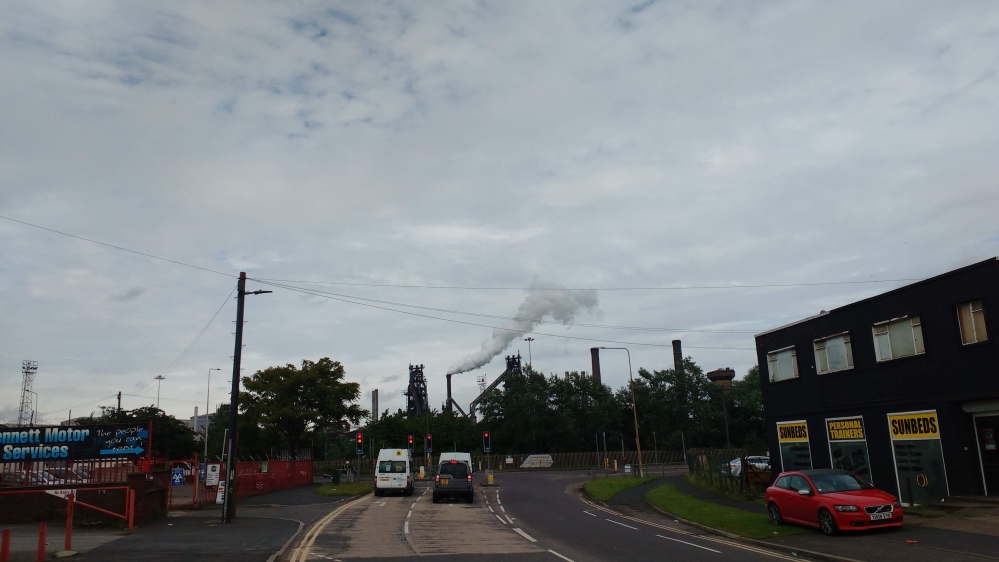The steel town at the centre of Britain’s Brexit identity crisis
British Steel’s potential collapse has become a national event in which people see their political prophecies affirmed.

When British Steel announced on May 22 that it was entering insolvency, steelworkers felt a sad sense of deja vu.
For at least the past 40 years, the industry’s future has seemed uncertain. British Steel alone has changed hands and names three times in that period, and was on the brink of closure as recently as 2016.
Keep reading
list of 4 itemsNorthern Ireland agreement could end deadlock, restore government
Forced to become British: How Brexit created a new European diaspora
Number of Britons regretting Brexit hits new record high: Survey
Back then, when the London private-equity firm Greybull Capital stepped in, there were early signs of promise. The new owners restored the steel company’s original name, and turned a profit in their first year.
Few imagined that the “Save Our Steel” banners would need to be unfurled again so soon.
The unfolding saga of the steel industry in Britain is a significant economic story in itself. Once at the heart of world trade, still central to national identity, the 150-year-old steelworks in Scunthorpe in northern England were sold to Greybull Capital for only one British pound ($1.27) in 2016.
The company’s potential closure puts more than 30,000 jobs at risk – including jobs that come through its supply chains – and could cost the national economy as much as 2.8 billion pounds ($3.6bn) in lost wages.
But in the fraught political landscape that is Brexit Britain, the fate of British Steel is about much more than jobs and money. Its trials and tribulations are charged with symbolic significance, fitting into national narratives around the European Union, the economy and the future of Britain’s identity.
Scunthorpe's been neglected and there's a sense that someone needs to be to blamed.
Steel identity entwined
British Steel’s potential collapse has become a national event in which everyone sees their political prophecies affirmed.
The contradictions are almost comical. The Conservative government blames EU membership for Britain not being able to bail out British Steel, while British Steel blames Britain leaving the EU for the company needing to be bailed out at all.
For those on the left, the Conservative party’s refusal to intervene is ideological, confirming the need for a Jeremy Corbyn-led Labour government. For those on the right, this only shows how anachronistic a Corbyn-led government would be. It’s time, some argue, for Britain to leave its industrial past behind.
“Sometimes hard things need saying,” Daniel Hannan, a leading Conservative Brexiteer, wrote in the Daily Telegraph.
And so the small town of Scunthorpe, situated between its sprawling steelworks in the east and a vast new wind farm to the west, finds itself at the centre of a political battlefield, between past and future, left and right, leave and remain.
“It feels different this time,” Gwylim Williams, a 62-year-old union official who was a steelworker for 40 years, told Al Jazeera, recalling all the close calls in the past.
Now retired, Williams still refers to the British Steel workforce as “we” and remembers his time fondly.
“There was always doom and gloom about the future,” he admitted. But having watched the workforce whittle away and the industry as a whole suffer a steep decline, he fears the final end is only a matter of time.
“I look back at the characters,” he said. “We’ve lost so many great guys, even just at Christmas.”
Last December, Greybull Capital announced a fresh round of redundancies. Williams, like many others, saw this as an ominous sign.

In Scunthorpe, steel and identity are uniquely entwined. The discovery of iron in the 19th century transformed the area from a small set of villages into a thriving industrial town that was essential to Britain’s economy.
The stature and influence of Britain’s steel industry has faded over the decades, eclipsed by that of bigger countries. China has produced more steel than Britain’s steelworks accomplished in a century. But the bond between Scunthorpe and steel remains as strong as ever.
Scunthorpe’s football team is nicknamed “The Iron”. The local shopping mall is called “The Foundry”. A sculpture “dedicated to all past and present steelworkers and their families” stands in a central square. And the steelworks, with a depleted workforce of 3,000, is still the town’s biggest employer by far.
When its future is threatened, the entire community’s life is on the line. “There’s no Scunthorpe without it,” Richard Willis, 52, a former subcontractor at the steelworks, told Al Jazeera.
In normal times, such a story of industrial woe would provide easy pickings for Labour. According to a recent YouGov poll, the vast majority of the British public support re-nationalisation.
But as Willis and his friend Naj Modak – aged 42 and also a local Labour activist – both know, these are not normal times.
“Brexit has broken everything,” said Willis.
During the 2016 referendum, in which Labour campaigned to remain part of the EU, 68.5 percent of Scunthorpe residents voted to leave. In the recent European elections, Nigel Farage’s newly formed Brexit Party campaigned for a “no-deal” departure from the EU and won with an astonishing 47 percent of the vote, reducing Labour, in second place, to a historic low.
“Scunthorpe’s been neglected,” said Modak, “and there’s a sense that someone needs to be to blamed.”

The sharp edge of austerity
Like so many other towns and cities in Britain, especially in the north, Scunthorpe has felt the sharp edge of austerity.
The buzzing community cafe where Gwylim Williams is a customer is a rare exception. Outside, the high street is littered with boarded-up shops. Last year, five times as many shops closed in Scunthorpe as new ones opened – a higher rate than ever recorded, and the worst rate in the region.
Williams’s three children left Scunthorpe to go to university. “They ain’t gonna come back here,” he said. “To do what? The talent’s here, but there’s no investment.”
During the referendum, the idea that the EU was to blame for the steel industry’s decline was a dominant theme. A list of factory “casualties” rife with misinformation went viral online. Politicians obfuscated correlation with causation.
“When the UK joined the EU, we had a 45 million tonnes a year steel industry,” Conservative Brexiteer John Redwood said. “Today, we are battling to save an 11-million-tonne industry.”
For Farage, the choice was simple: “If we vote to remain on June 23rd, it is the end of the steel industry in this country. Simple as that,” he tweeted.
But the truth isn’t so simple. The causes behind the decline of Britain’s steel industry are complex, and pose questions about what kind of country Britain wants to be. Factors responsible include global trends, the rise of China, the great recession, automation, national contingencies, the uncertainty of Brexit, a weak currency, and a lack of state investment.
If British Steel has a future, it will need a detailed strategy and, according to reports, at least 500 million pounds ($636m) in investment. By comparison, Greybull Capital invested 20 million pounds ($25m).
Bids are being considered until at least the end of the month. With the ill-fated tenure of Greybull Capital, there is also greater scrutiny of who a viable bidder would be. Many now wonder whether a private-equity firm like Greybull Capital should have been allowed to buy British Steel at all. The company claims to specialise in saving flailing businesses. But it has a much better record of letting them go bust and of extracting high management fees along the way. Greybull reportedly charged British Steel three million pounds ($3.81m) annually in management fees in 2017-2018. And that was on top of 17 million pounds ($21.6m) that Greybull’s parent company charged British Steel each of those years in loan interest.
“Private equity is short term,” John Colley, professor of practice at Warwick Business School, told Al Jazeera. “Companies like Greybull, if they think they’re not going to make a fairly rapid return on the money they put in, frankly, they’ll walk away from it. With something like British Steel, all the liabilities just go to the government anyway. Greybull are insulated from it.”
That business model, premised on quick profits for investors, is the antithesis of what British Steel needs, said Colley.
And British Steel’s fortunes could get worse. While staying in the EU won’t fix the company, leaving could make it worse, warned Gareth Stace, the director general of the trade association UK Steel, in a recent op-ed in The Guardian. This is especially true of the “no-deal” divorce from the EU advocated by Farage’s Brexit Party, which has positioned itself as the saviour of British Steel.
In early June, during a press conference in Scunthorpe, the party announced its first policy beyond Brexit: saving British Steel. This affirmed, once again, its desire to forge an indelible link between leaving the European Union and reviving Britain’s heavy industries in the north.
But Farage’s new party – mostly led by millionaires – may have some convincing to do, given the professional background of one of its lead candidates, the property tycoon Mike Greene. Before standing as an MP for the Brexit Party, he was the business partner of a private equity firm: one Greybull Capital.
For Scunthorpe’s steelworkers, it might have felt like deja vu again.